Selected Ambrosial Quotes
From the Hari-kathā of Śrī Śrīmad Bhaktivedānta Nārāyaṇa Gosvāmī Mahārāja
[Except where noted, all excerpts are compliments of the Hari-kathā team]
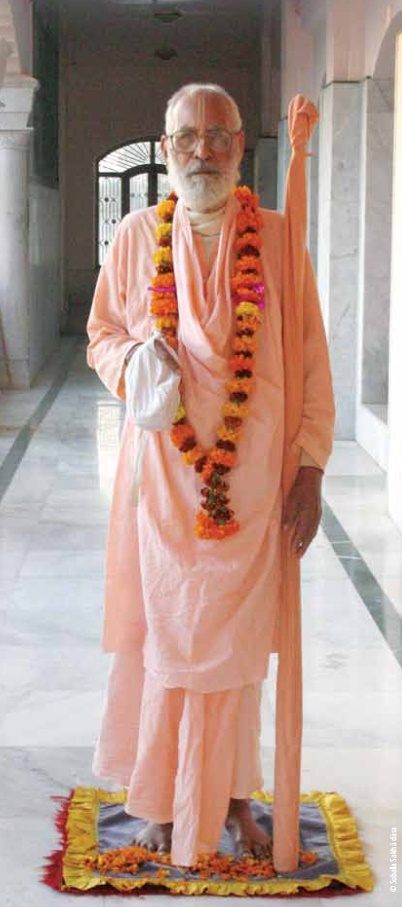
The Meaning and Purpose of Vyāsa-pūjā
Vyāsa is the personality who delineated the glories of the names, form, qualities and pastimes of Bhagavān in this world. The ceremony to honour the ācārya who, sitting on a throne in the service of Bhagavān, preaches His glories and attracts people towards Him is called vyāsa-pūjā. Another name for vyāsa-pūjā is guru-pūjā. In India, the general convention is that guru-pūjā is observed on the day of Guru-pūrṇimā. It is considered Vyāsa’s appearance day, and on that day all sampradāyas worship their respective gurus. But in accordance with the scriptures, the primary ācārya of modern times, Śrī Śrīmad Bhaktisiddhānta Sarasvatī Gosvāmī Prabhupāda, established special worship of the guru on that guru’s own specific appearance day. Real guru-pūjā is when, on his appearance day, the guru worships his whole guru-paramparā and instructs his disciples on how to do the same.
na martya-buddhyāsūyeta sarva-deva-mayo guruḥ
Know the ācārya, or spiritual preceptor, to be Me. One should never disrespect him under any circumstance, nor should one envy him, thinking him an ordinary man, for he is the embodiment of all the demigods.
There are so many jīvas in this world, and although some are inclined toward Bhagavān, most are averse to Him. Their intrinsic forms are as eternal servants of Kṛṣṇa, but forgetting this, they are wandering in material existence. Without bhakti they will never possess any auspiciousness. Therefore sometimes Kṛṣṇa Himself descends into this world, sometimes He assumes different incarnations, and sometimes He sends His śakti in the form of the guru. Otherwise it would be impossible for the jīvas to ever receive auspiciousness. Only by bhakti can they attain their ultimate good fortune; yet bhakti is not a thing of this world. Inside the eternally perfected associates of Kṛṣṇa, the essence of the saṁvit- and hlādinī-śaktis is always present in the form of prema-bhakti. Until the jīva receives that essence, he will not possess any real auspiciousness. The guru is a resident of the spiritual world, and he descends into this world. He brings the prema of Goloka Vraja to this world and bestows it upon the conditioned souls. Such a great personality, an eternally perfected rāgātmikā devotee who possesses vraja-prema and brings it to this world, is known as a śuddha-guru.
As the current of the Gaṅgā carries water from the Himālayas down to the ocean, there is a current flowing through our guru-paramparā which, beginning from Kṛṣṇa Himself, has come down to the modern ācāryas and is presently flooding the entire material world with kṛṣṇa-prema. This is the primary function of the guru. If someone is not able to give this prema, then he is not really a guru at all. Being capable of bestowing kṛṣṇa-prema is the primary attribute of a genuine Vaiṣṇava guru.
Śrī Prabandhāvalī, Chapter One
The Appearance Day of Śrī Śrīmad Bhaktivedānta Vāmana Gosvāmī Mahārāja
************
[My gurudeva said:] “Not only we Indians but the whole world is eternally indebted to Śrī Kṛṣṇadvaipāyana Vyāsa. He divided the Vedas into four parts to help general people who are trying to study them. He compiled Vedānta, or Brahma-sūtra, in order to reconcile apparent contradictions between Vedānta and the Upaniṣads, the essence of the Vedas. He composed the different Purāṇas and the Mahābhārata and finally, in order to make Vedānta-sūtra easily understandable, he himself manifested the spotless mahā-purāṇa, Śrīmad-Bhāgavatam, as the commentary on Vedānta-sūtra.
“All the religious societies in India believe that somehow or other they are followers of Vyāsa (vyāsānuga). However, when we carefully study the literature composed by Śrī Vyāsadeva, we can clearly see that bhagavad-bhakti is the main subject matter. He has not mentioned the words jñāna and mukti anywhere in the 550 sūtras of his famous Brahmā-sūtra. On the contrary, he has established bhakti everywhere in the genuine commentary of his Brahma-sūtra, namely paramahaṁsī saṁhitā Śrīmad-Bhāgavatam.”
***********
[My gurudeva said:] Śrī Vyāsadeva is worshipped properly in the Vaiṣṇava sampradāya. Nowadays, we see that, in the name of vyāsa-pūjā, so-called gurus everywhere accept puṣpāñjali and arcāñjali offered to their own feet, and they hear and accept praise given to them by their own disciples. However, those who only accept puṣpāñjali and arcāñjali offered to their own feet and who do not follow śrī vyāsa-pūjā-paddhati (the process of vyāsa-pūjā which was discerned by Śrīla Bhaktisiddhānta Sarasvatī Prabhupāda) are not actually performing vyāsa-pūjā. On vyāsa-pūjā day an ācārya will worship guru, guru-paramparā and upāsya. According to this pūjā-paddhati, on that day one should worship the following:
(1) guru-pañcaka (śrī guru, parama-guru, parameṣṭhī-guru, parātpar-guru, paramparātpar-guru);
(2) ācārya-pañcaka (Śrī Śukadeva, Rāmānuja, Madhva, Viṣṇusvāmī, Nimbāditya);
(3) vyāsa-pañcaka (Śrī Vedavyāsa, Pail, Vaiśampāyana, Jaiminī, Sumanta);
(4) sanakādi-pañcaka (Śrī Sanaka, Sanatkumār‚ Sanātan, Sanandan, Viṣvaksena);
(5) kṛṣṇa-pañcaka (Śrī Kṛṣṇa, Vāsudeva, Saṅkarṣaṇa, Pradyumna, Aniruddha);
(6) upāsya-pañcaka (Śrī Rādhā, Kṛṣṇa, Gaura, Gadādhara, śrī gurudeva) and
(7) pañca-tattva (Śrī Kṛṣṇa Caitanya, Nityānanda, Advaita Ācārya, Gadādhara, Śrīvāsa).
“It is the supreme duty of Śrī Gauḍīya Sārasvata Vaiṣṇavas to follow the vyāsa-pūjā-paddhati used by Śrīla Prabhupāda.”
Ācārya Keśarī Śrī Śrīmad Bhakti Prajñāna Keśava
Gosvāmī Mahārāja – His Life and Teachings, Third Part.
(The vyāsa-pūjā of oṁ viṣṇupāda Śrī Śrīmad Bhakti Jīvana Janardana Gosvāmī Mahārāja at Śrī Gauravāṇī-Vinoda Āśrama in Khaḍagpura, 8 February, 1958)
***********
Vedavyāsa explained that the essence of the meaning of the brahma-gāyatrī comes from oṁkara. Gāyatrī is feminine in gender. Who is Gāyatrī? We hear that she is the wife of Brahmā, but you should know what has been told in the gāyatrī-mantra – bhargo devasya dhīmahi.
Bharga means ‘power’; that is, hlādinī-śakti, or mahābhāva-svarūpa (Śrīmatī Rādhikā). The supreme reservoir of kṛṣṇa-prema is Rādhikā. We learn that Gāyatrī is the wife of Brahmā, but who is she actually? She is a gopī. Kṛṣṇa had told Yogamāyā, “You should somehow try to give this gopī to Brahmā; otherwise she cannot be parakīya (My paramour beloved).”
All the gopīs are married to other gopas and in this way, parakīya-rasa takes place. Kṛṣṇa therefore ordered Yogamāyā to arrange a marriage for Gāyatrī-devī also, so that her love for Kṛṣṇa and her relationship with Him could also be parakīya. This is why Gāyatrī came to be given to Brahmā in marriage. She actually had no love for Brahmā; she loved only Kṛṣṇa. This parakīya mood is topmost, and because she had that mood, Gāyatrī became the maidservant of Śrīmatī Rādhikā. We see that Gāyatrī is the essence of all the Vedic literatures. Gāyatrī is Rādhikā, or Her maidservant, so that mood may come to anyone who serves the gāyatrī-mantra.
This is a special thing. I have never told this before.
Vyāsa-pūjā,
Alachua, Florida, 1 February 2003
***********
What is vyāsa? The line that touches the opposite sides of the circumference of a circle, by going through the central point, is called the diameter, or vyāsa. What is the meaning? Kṛṣṇa is the centre of all. This circle comprises not only this world, but so many universes – crores and crores of universes. Vyāsa is touching Kṛṣṇa and going to all the innumerable ends of material existence. Who is Vyāsa? He who is preaching the glories of Kṛṣṇa to all, teaching everyone: “You should serve Kṛṣṇa; otherwise no one can save you from this endless chain of birth and suffering.” Vyāsa is he who is always serving Kṛṣṇa from one end of this creation to another – everywhere in this world.
***********
After some time Vyāsadeva divided the Vedas in four – Ṛg Veda, Sāma Veda, Yajur Veda and Atharva Veda. After that he wrote the essence of all the Vedas, and that was called Brahma-sūtra, Sarika-sūtra, or Vedānta-sūtra. After that he wrote thirty-six kinds of Purāṇas: Purāṇas, Upa-Purāṇas and Śakha-Purāṇas. Then, for all persons: for ladies, for śūdras and for those who always lament and who are entangled in worldly intoxications, he wrote the Mahābhārata; and in that he gave the jewel-like Gitopadeśa. Prior to this he gave Catuḥ-ślokī Bhāgavatam, which Nārada had received from Brahmā. But still Vyāsadeva had not realized Śrīmad-Bhāgavatam, yet and so he was not satisfied.
Nārada came to him and asked, “Why you are so upset?”
Vyāsadeva replied, “Gurudeva, I do not know.”
Nārada then told him, “You have not glorified Kṛṣṇa and His Vṛndāvana pastimes, and you have not discussed how the gopīs and all the Vrajavāsīs serve Him. You should glorify Him, and especially His many devotees, His preyasīs (the gopīs) and His beloved Rādhikā.”
Vyāsadeva then saw all the pastimes of Kṛṣṇa and His associates in his trance, and thus he wrote Śrīmad-Bhāgavatam and became happy. The essence, therefore, of all Vedic literature – the Upanisads, Purāṇas and Bhāgavatam – is vraja-prema, or gopī-prema, and especially the love and affection of Śrīmatī Rādhikā, who controls Kṛṣṇa and always keeps Him in Her heart.
A guru can give these truths; without receiving them from him, it is not possible to understand these mysterious truths. A guru gives all this to the śiṣya (disciple) so that the śiṣya will one day become happy.
Appearance Day of Śrī Śrīmad Bhakti Prajñāna Keśava Gosvāmī Mahārāja
Singapore, 11 February 2001
***********
On this day, a disciple or ācārya bows down at the lotus feet of śrī gurudeva, from whom he has obtained all kinds of knowledge. You should especially know that tattva-jñāna, knowledge of established philosophical truths, is not sufficient. From where will the mood come to weep, as the gopīs used to weep? Śrīmatī Rādhikā is always weeping, intoxicated in kṛṣṇa-prema. Kṛṣṇa laments and suffers for Her, but He does not become as maddened with love as She does. There are many manifestations of Rādhā dancing with Kṛṣṇa, but for Rādhikā there is only one K ṛṣṇa. Vyāsadeva is himself Nārāyaṇa, and he has revealed all this.
Vyāsa-pūjā
Alachua, Florida, 1 February 2003
***********
We are all in one Gauḍīya family. Our gurudeva is serving Śrī Śrī Rādhā-Kṛṣṇa in the line of Raghunātha dāsa Gosvāmī. Money and other material things will not suffice as a presentation for vyāsa-pūjā. The only worthwhile present is absorption in kṛṣṇa-bhajana. This is real puṣpāṅjali.
Appearance Day of Śrī Śrimad Bhakti Prajñāna Keśava Gosvāmī Mahārāja
Mathurā, 22 February 2000
***********
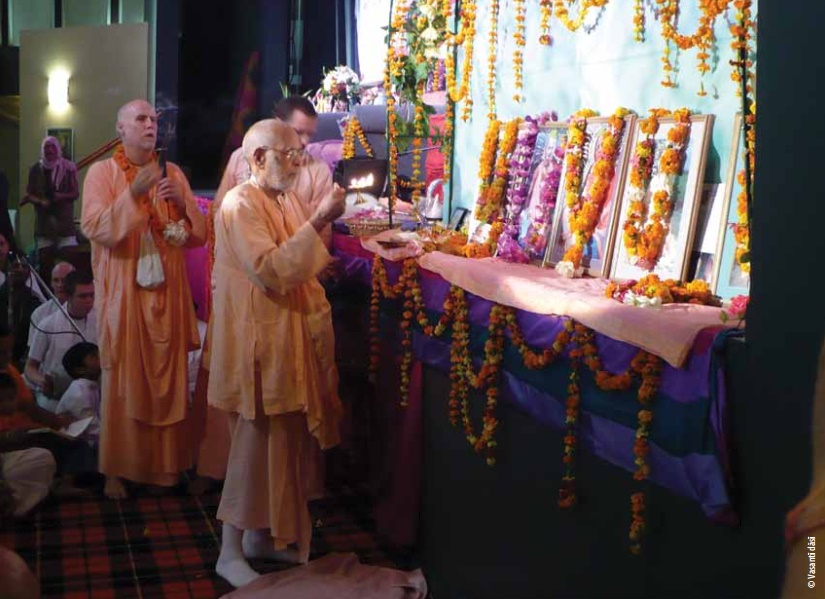
Vyāsa-pūjā Includes the Worship of the Whole Guru-paramaparā
In our Brahmā-Madhva-Gauḍīya sampradāya it is the custom for any ācārya who is widely spreading Kṛṣṇa consciousness in the line of Śrī Caitanya Mahāprabhu and Śrīla Rūpa Gosvāmī, under the guidance of Śrī Kṛṣṇa Dvaipayana Vyāsadeva, to worship Śrīla Vyāsadeva and the guru-paramparā on his birthday. This worship is called guru-pūjā and also vyāsa-pūjā.
Why do we perform bhakti to Śrī Kṛṣṇa? Why is it that we pay so much respect to śrī gurudeva? If we are spiritually advancing under someone’s guidance, we respect that person. No gain, no respect. Śrī gurudeva always feels indebted to his gurudeva and the guru-paramparā. Without guru, guru-paramparā, Śrī Caitanya Mahāprabhu and Śrī Kṛṣṇa, what is there? Nothing. In other words, without them, there can be no spiritual advancement. Śrī guru considers that all of his tattva-jñāna, knowledge of established truths, and all of his bhakti is the mercy of śrī gurudeva and his guru-paramparā. Śrīla gurudeva is not independent of his guru-paramparā, which comes from Śrīla Vyāsadeva. He is fully dependent on them.
Being a manifestation of Lord Nārāyaṇa Himself, Śrīla Vyāsadeva is the root of all gurus, and he has written in his books – Śrīmad-Bhāgavatam, Purāṇas and all other scriptures – about the great debt we owe to Lord Kṛṣṇa.
Alone, a person is never able to seek out a bona fide guru. If you search on your own, you will select a bogus guru, because you do not know who is guru nor do you know his qualities and standards. You will have to judge by the words of Vyāsadeva:
jijñāsuḥ śreya uttamam
śābde pare ca niṣṇātaṁ
brahmaṇy-upaśamāśrayam
Therefore, one who wishes to know about the ultimate goal of life should take shelter of a bona fide guru. Such a guru will be fully conversant with the Vedic scriptures and have direct realization of the Supreme Lord. Consequently, he will be wholly detached from worldly life.
Śrīla Vyāsadeva has given this definition of guru, and our guru-paramparā has accepted it. If you are going to search out your gurudeva independently, I think that most of you will select a bogus guru who is fallen. You will choose Australian kan-guroos – nothing more than that. When you have the association of a high class devotee you will have power to judge – not before that.
Vyāsa-pūjā
Hilo, Hawaii, 21 January 2004
***********
On this special day, I pray to my gurudeva and our entire guru-paramparā up to Lord Brahmā, to all the associates of Śrī Śrī Rādhā-Kṛṣṇa and to all the associates of Śrī Caitanya Mahāprabhu and Śrī Nityānanda Prabhu. I pray that they will sprinkle their mercy upon all of you.
I pray that they will also be merciful to all the devotees in the world, wherever they may be, who are giving their puṣpāṅjali today. I pray that they will bestow their mercy, even upon those who are not giving any puṣpāñjali, but simply remembering, wherever they are. I pray to all these associates of the Lord to be merciful and take away the entirety of your anarthas, to place vraja-prema, vraja-bhakti, in your hearts, and to sprinkle upon you the goal of our life.
Vyāsa-pūjā
Hilo, Hawaii, 8 February 2005
***********
My gurudeva used to say, “On my birthday I should give proper honour to all guru-paramparā ācāryas, Godbrothers and all senior Vaiṣṇavas. What I have and what I am preaching is not coming from me. It is not that I am so intelligent or that I am preaching – the credit belongs to my gurudeva. By the mercy of my gurudeva I know the mercy of Śrī Caitanya Mahāprabhu, Śrī Rūpa-Sanātana, Śrī Rūpa-Raghunātha and other guru-paramparā ācāryas.
Murwillumbah,
Australia, 9 February 2004
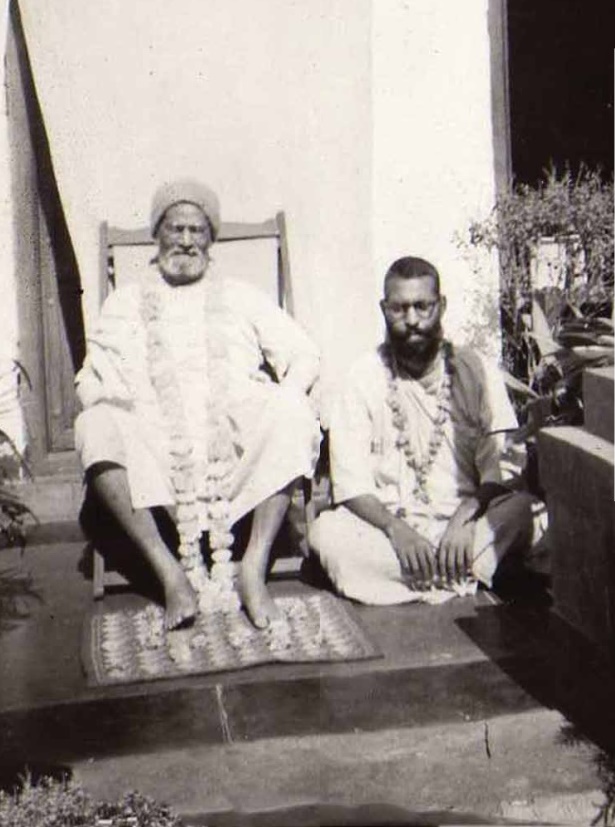
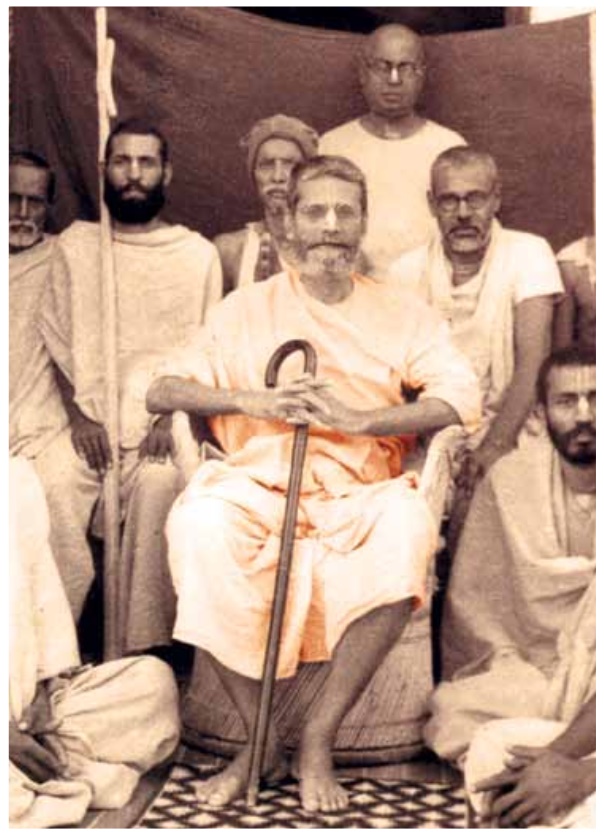
Śrī Guru’s Mercy Can Do Anything
I was not a learned person. Whatever understandings I have today, I received by the special mercy of śrī guru and the Vaiṣṇavas. I gave my whole heart to my gurudeva and offered all that I possessed at his lotus feet. When I joined the maṭha, I told my gurudeva, “I am giving my heart to you. I am giving you the love and affection I had for my wife, my children, my father and everything else. I am taking that love and affection, and in total surrender, I am placing it at your lotus feet.”
He heard my words and accepted them. Tears came into his eyes and he wept, saying, “Until now, no one has told me this.” I thus received his causeless mercy. Now, only because of that mercy, people all over the world are hearing from me. If you surrender to your gurudeva, you will receive everything you require to attain the perfection of life and to make others perfect. No material knowledge is needed.
Vyāsa-pūjā
Hilo, Hawaii, 8 February 2005
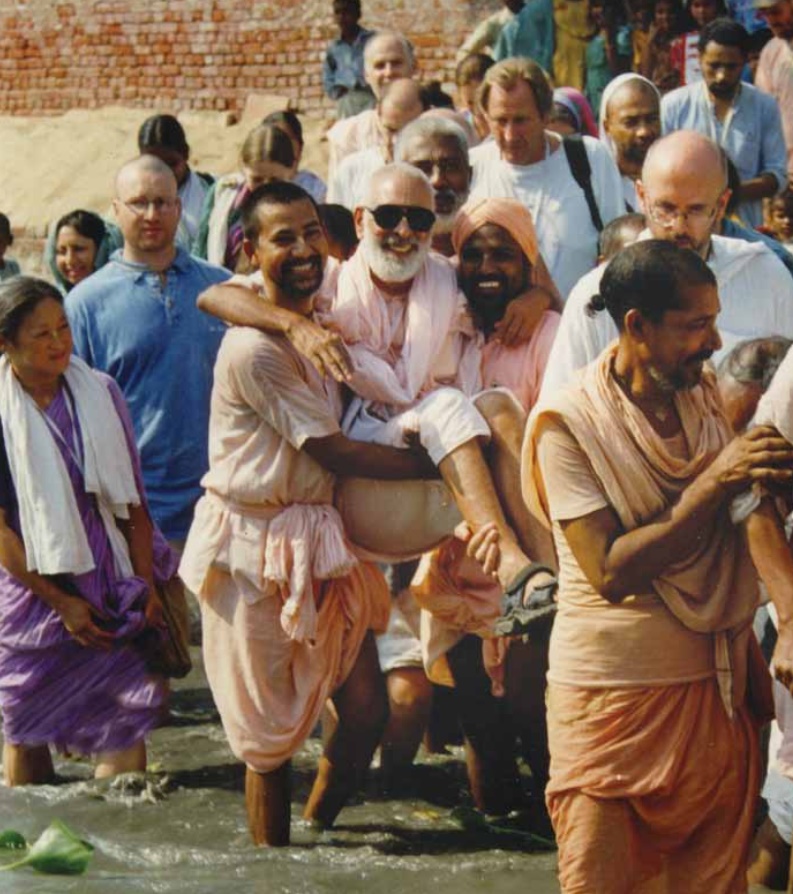
***********
Śrī Guru Is Not An Ordinary Mortal Being
It may seem like guru is going to the bathroom or that he is eating because he is hungry. But do not see him as you would see an ordinary person, otherwise you will be cheated forever.
Have strong faith in guru, more than in Kṛṣṇa. Śrīmatī Rādhikā and Kṛṣṇa have sent him as Their own messenger. We should always remember this, especially on the auspicious day of vyāsa-pūjā.
***********
I especially fear that sometimes false ego comes in the hearts of learned disciples and they think, “I am more than my gurudeva.” This is a very dangerous offense, and such offenders are ultimately lost forever. Do not have false ego regarding any aptitude you may have. Always be the servant of gurudeva. There are so many examples of pure servants, such as Śrīla Īśvara Puripāda, Śrīla Rūpa Gosvāmī, Śrīla Sanātana Gosvāmī and Śrīla Jīva Gosvāmī.
***********
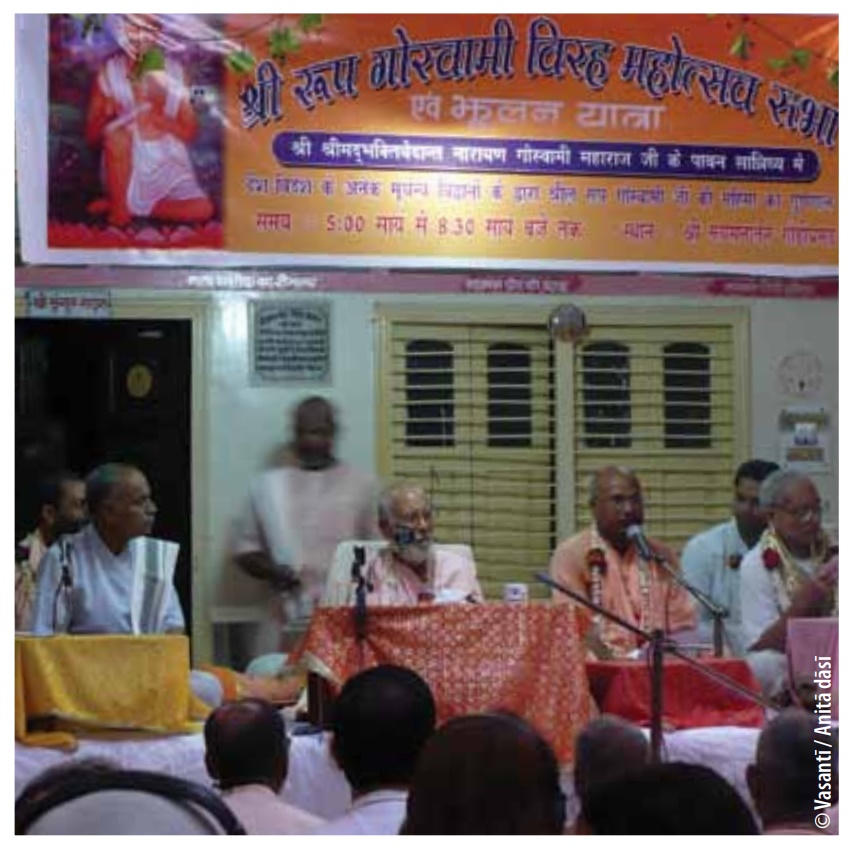
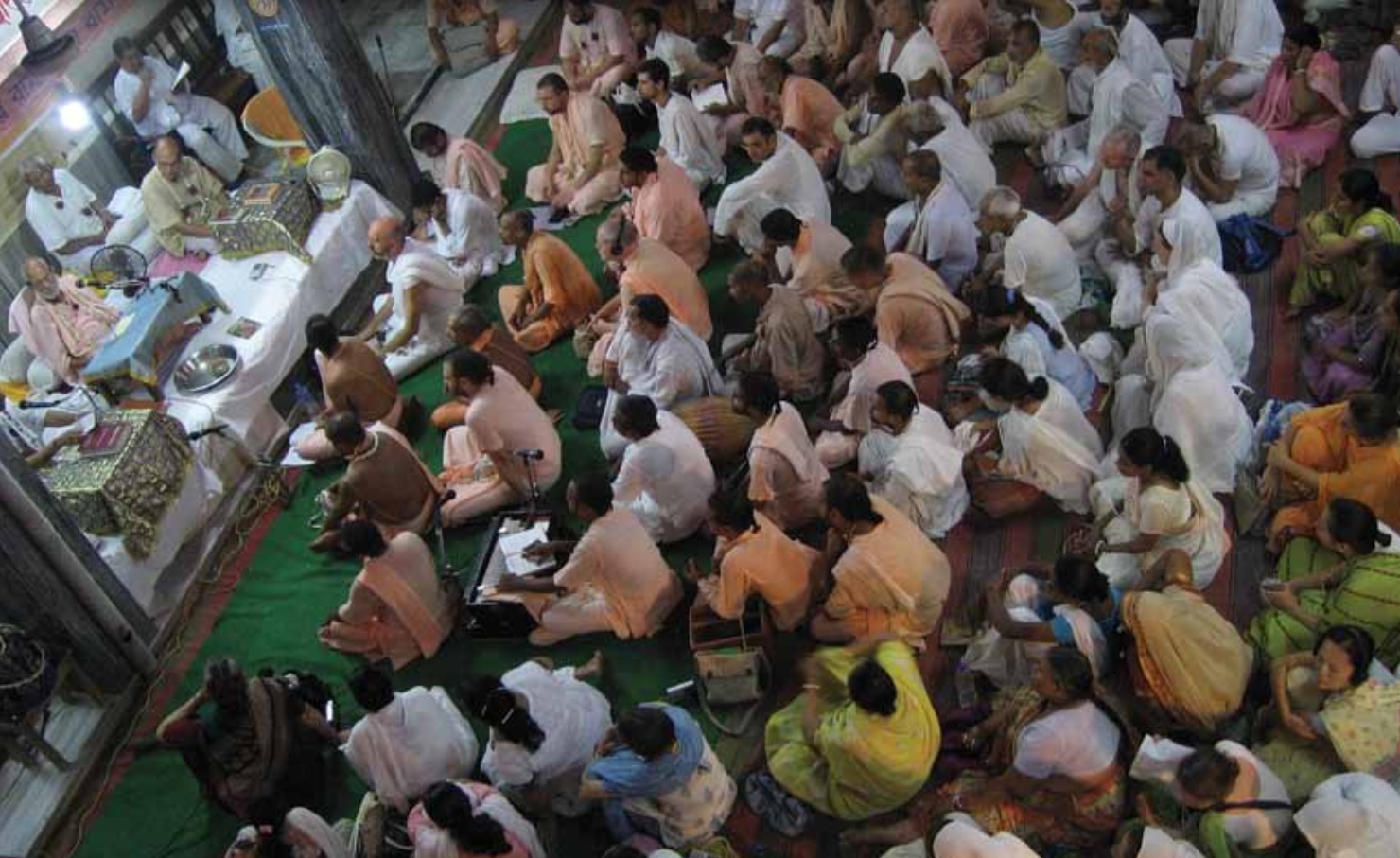
The Speciality of Our Guru-paramparā
The nature of the pure Vaiṣṇavas in our paramparā is that when they actually sprinkle their mercy upon you, you will enter rāgānuga-bhakti. Under the guidance of Śrī Rūpa Gosvāmī (Śrī Rūpa Mañjarī) you will serve Śrī Śrī Rādhā-Kṛṣṇa, with an inclination towards Śrīmatī Rādhikā. This truth is very confidential, and I have brought you here to understand it. Following in the line of our ācāryas and by their desire, I am revealing many things about rāgānugā-bhakti.
No one else is speaking like this. All are silent, but I am not silent. In our entire paramparā hardly anyone will give this. I want you all to have rāgānugā-bhakti. To get it, however, you will have to surrender.
Vyāsa-pūjā
Hilo, Hawaii, 8 February 2005
Śrī Guru’s Role in Kṛṣṇa-līlā
What is the meaning of nikuñja-yūno rati-keli-siddhyai? What is that guru doing?
Guru must be like this: nikuñja-yūno rati-keli-siddhyai. He must be serving Rādhā and Kṛṣṇa Conjugal, especially Rādhikā. The gopīs make so many arrangements for Them to meet. Yā yālibhir yuktir apekṣaṇīyā. They know how to cheat their fathers, mothers and husbands in so many ways, to ensure the successful meeting of Rādhā-Kṛṣṇa Conjugal and to serve Them. A guru is very expert in all these activities.
We see in our guru-gāyatrī, kṛṣṇānandāya dhīmahi. This refers to both Kṛṣṇa and Kṛṣṇā. Any male can serve Kṛṣṇa, but no male can serve Kṛṣṇā. Kṛṣṇā is Rādhikā. Therefore, in śrī guru’s service to Rādhikā for rati-keli-siddhyai – the perfection of Her amorous pastimes with Kṛṣṇa, he cannot serve in his male form. Śrīla Svāmī Mahārāja and my gurudeva both serve there as gopīs. My gurudeva is Vinoda Mañjarī, Śrīla Prabhupāda Bhaktisiddānta Sarasvatī Ṭhākura is Nayana Mañjarī, Śrīla Bhaktivinoda Ṭhākura is Kamala Mañjarī, Śrīla Jīva Gosvāmī is Vilāsa Mañjarī, Śrīla Rūpa Gosvāmī is Rūpa Mañjarī, and Śrīla Raghunātha dāsa Gosvāmī is Rati Mañjarī. These mañjarīs can serve Rādhā-Kṛṣṇa Conjugal.
***********
I offer praṇāma to my gurudeva in that very form. He is cheating others, and he is even cheating Kṛṣṇa. By such ‘cheating’, he brings Kṛṣṇa to serve His most beloved Rādhikā. In Śrī Caitanya-caritāmṛta it has been very openly told that Śrīmatī Rādhikā is the guru of Kṛṣṇa. Why not take shelter in the lotus feet of She who is the guru of Kṛṣṇa? Our guru is there, in Goloka Vṛndāvana, serving Rādhikā.
Actually, guru is one who can serve Rādhikā. If a guru has fully controlled his senses, but he is not directly serving Rādhikā, he is only partially guru.
***********
If guru is not like Rūpa Mañjarī and Rati Mañjarī, and if he is not serving them, he may be a guru in part but not in full. The guru’s most exalted quality is that he is a servant of Rādhikā. In this way, Śrīla Viśvanātha Cakravartī Ṭhākura is writing, vande guroḥ śrī caraṇāravindam. I bow down to my gurudeva and all gurus in the line of Śrī Rūpa Gosvāmī. Such a guru is not only the prakāśa (manifestation) of Nityānanda Prabhu, or Baladeva Prabhu, but he is also the prakāśa of Rādhikā. Such a guru is the most exalted. Even Baladeva Prabhu, as Anaṅga Mañjarī, takes shelter of Śrīmatī Rādhikā’s lotus feet. How beautiful and glorious She is.
Vyāsa-pūjā
Murwillumbah, Australia, 12 February 2002
***********
It is necessary that one understand Śrīla Rūpa Gosvāmī’s special contribution to our sampradāya and why Śrī Caitanya Mahāprabhu appeared in this world. In essence, it was to specify our life’s highest and most prominent goal: to become a particle of dust at the lotus feet of Śrīla Rūpa Gosvāmī, to become a maidservant of Śrīmatī Rādhikā under the guidance of Śrīla Rūpa Mañjarī. This is the sole cherished aspiration for all our previous guru-varga.
The eve of Śrī Guru-pūrṇimā
Śrī Keśavajī Gauḍīya Maṭha, Mathurā, 16 July 2008
***********
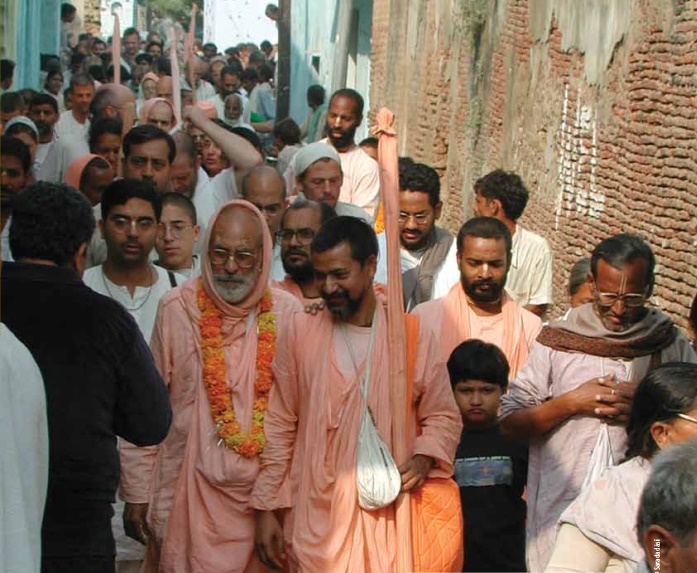
Sincerity Qualifies One to Meet a Bona Fide Guru
From whatever position you are in, try to be in the good association of pure Vaiṣṇavas. Śrī Kṛṣṇa will arrange this if you pray from the core of your heart. He will send your gurudeva to your door. You cannot search for a guru. You have no idea how to recognize his qualifications. In millions and millions of births you cannot know this on your own, but Kṛṣṇa will mercifully send a qualified guru if you are sincerely desiring this.
Kuala Lumpur, Malyasia, 15 February 2004
***********
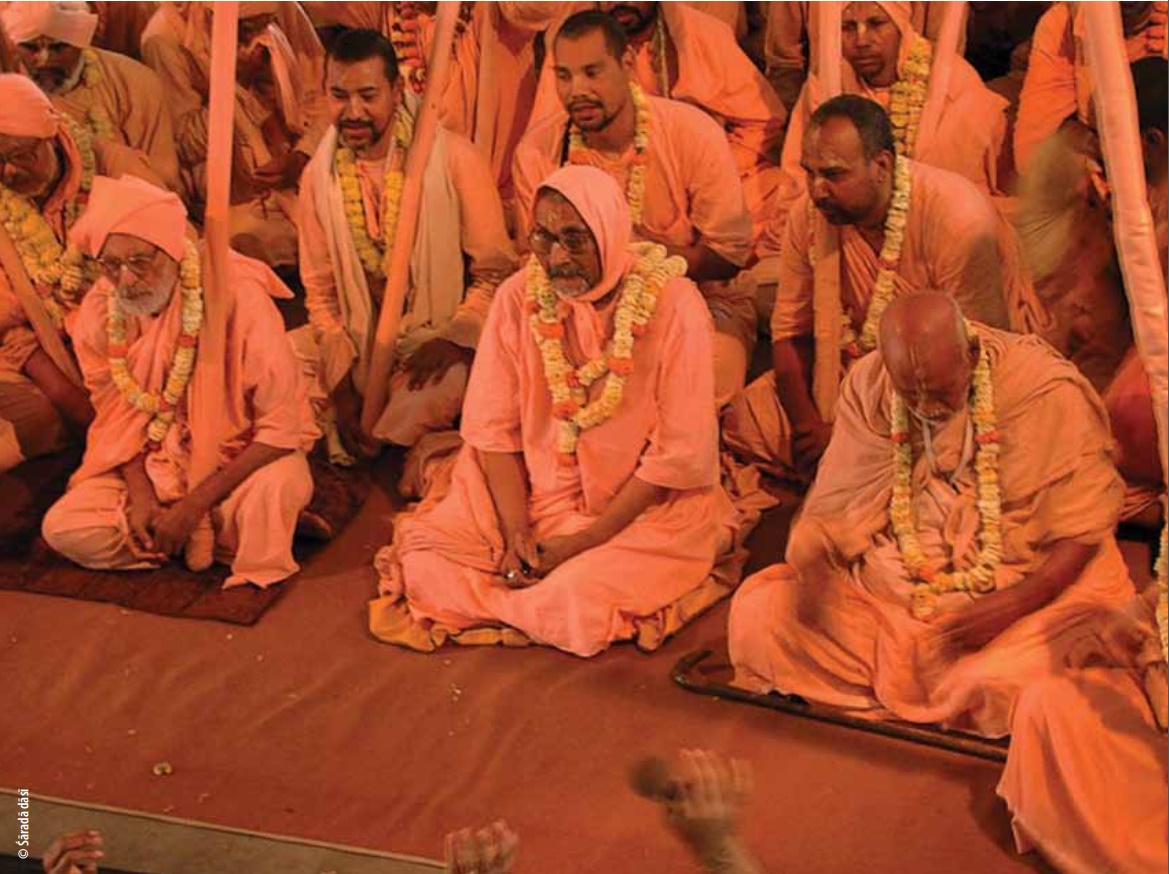
Guru-niṣṭhā – the Backbone of Bhakti
What is the symptom of one who has guru-niṣṭhā? He will give proper respect even to a dog that is related to his guru. If he does not give proper respect to everyone related to his guru, whether they are initiated or not, if he has no regard and honour for them, then his honour for his guru is actually a show. He has no real guru-niṣṭhā.
***********
The symptom of guru-niṣṭhā is that one always offers respect to superiors – especially to Godbrothers. Nowadays, I see that Godbrothers quarrel with each other. They do not want to be together, to glorify their guru.
Murwillumbah, Australia, 9 February 2004
***********
Even if one has ananyā-bhakti to Śrīmatī Rādhikā but no guru-niṣṭhā, his bhakti will be zero. One should take one’s life in the palm of one’s hand. In other words, the disciple should perform any service, even a dangerous one, for śrī gurudeva. He should sacrifice any mundane relationship, any desire and any activity, for guru-sevā.
Appearance day of Śrī Śrimad Bhakti Prajñāna Keśava Gosvāmī Mahārāja
Mathurā, 22 February 2000
***********
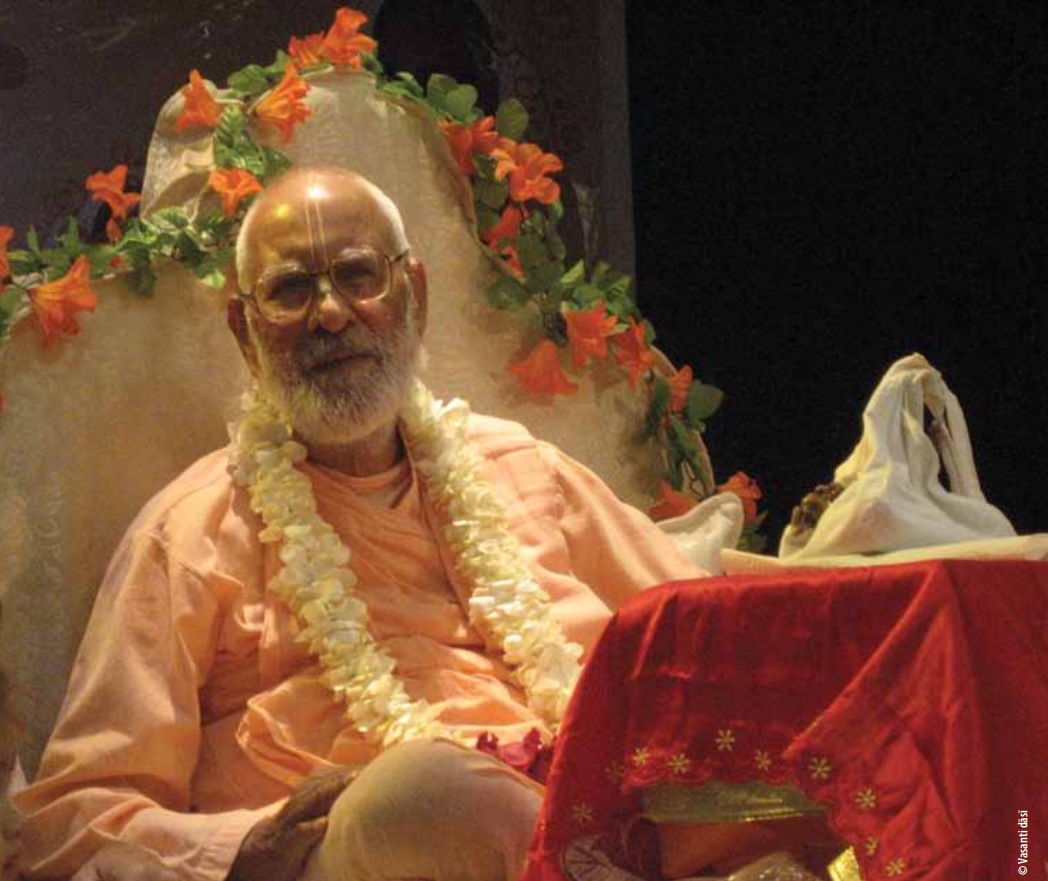
Remembering the Glory and Mercy of Śrī Guru
If we can please our gurudeva, not only externally but internally as well, then vyāsa-pūjā is truly observed. We should try to realize the internal ways our gurudeva pleases his gurudeva.
Apply this śloka (anyābhilāṣitā-śūnyaṁ…), totally and fully, at the lotus feet of your gurudeva. Now, I realize something of the glories of my gurudeva, and I cannot express the feelings of my heart for him. He was a great ocean of mercy. He took me from the well of stool, and he wanted to place me in the ocean of rasa – Bhakti-rasāmṛta-sindhu and Śrī Ujjvala-nīlamaṇi. By his special mercy, I touched something of the glory of the truths these literatures contain regarding prema, sneha, māna, praṇaya, rāga, anurāga, bhāva and mahābhāva up to madanākhya. I have understood something, but whose glory is this? I was not a learned person, and I was very insignificant. I know that I had no qualification at all; I was fully ignorant. However, by touching Gurudeva’s lotus feet and by hearing his hari-kathā, I received from him all the various kinds of knowledge that I am giving to the world. I am not giving it; my guru-varga are inspiring me, and everything is taking place by their mercy.
When I remember my gurudeva’s mercy in this way, I become overwhelmed. How glorious is his mercy! If one does not touch the real glory of one’s gurudeva and serve him totally, how can he ever please him?
Gurudeva is sarva-bhūta sthitam (situated in everyone’s heart), like Kṛṣṇa. Kṛṣṇa is everywhere, and so is gurudeva. So you can never hide anything from him. You want to hide so many things, like your lust and worldly desires, but since gurudeva knows even more than Kṛṣṇa, because he is so near to Kṛṣṇa, you cannot cheat him. If you try to cheat him, you will simply be cheating yourself – so do not try to do so. Reveal your heart to the lotus feet of your gurudeva and then you will know how to please him.
Vyāsa-pūjā
Alachua, Florida, 1 February 2003
***********
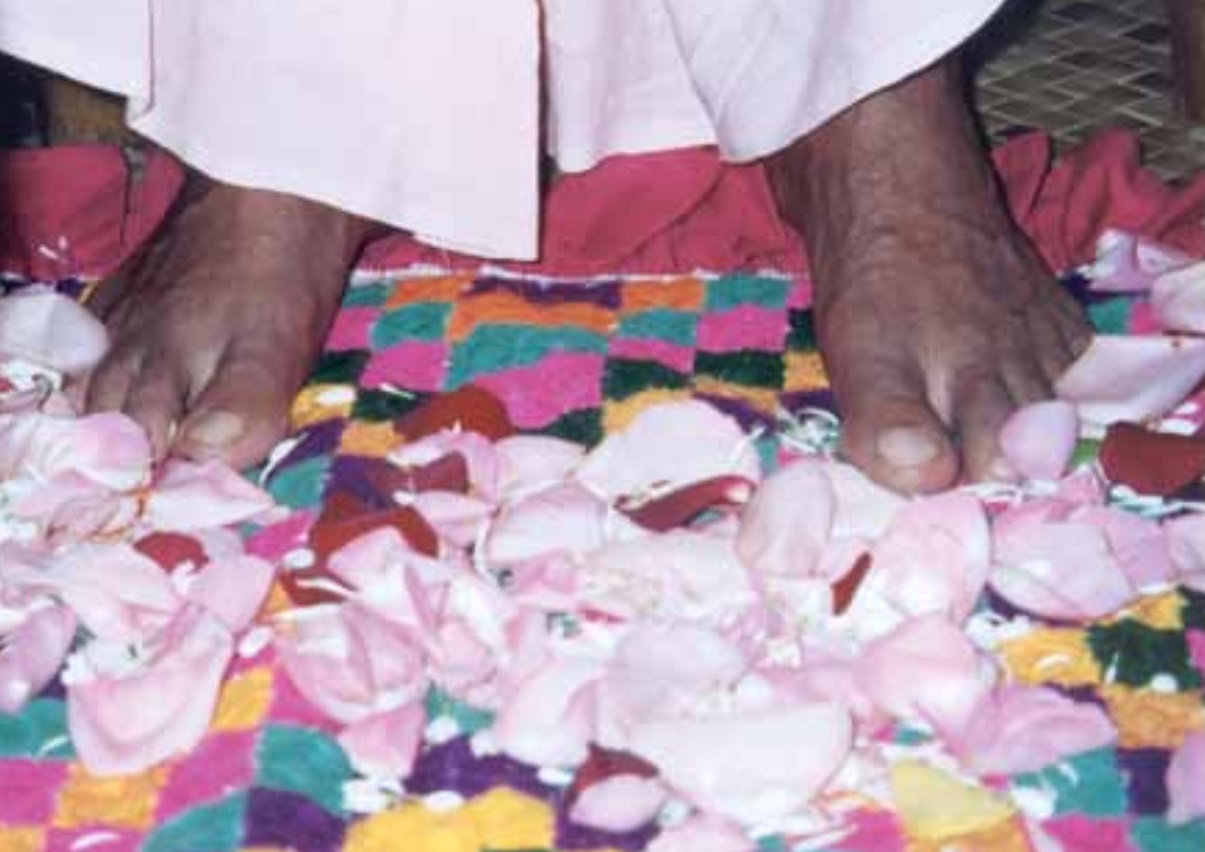
We should pray to the lotus feet of śrī gurudeva, and remember him. We pray that he gives us a drop of his mercy, so that we can became more humble than a blade of grass. We may try to achieve that humility on our own, but without śrī guru’s mercy, our attempts will be ruined and disturbed. In order to become amāninā mānadena, that is, in order to have the power to give all respect to others and be free from any desire for self-respect, we must weep for śrī gurudeva and get his mercy.
Appearance day of Śrī Śrimad Bhakti Prajñāna Keśava Gosvāmī Mahārāja
Mathurā, 22 February 2000
***********
One should think that one's guru is always powerful enough to enter one's heart – directly and indirectly – and that he can save his disciples. Then that disciple is really a disciple, otherwise not. Śrī guru can somehow, directly or indirectly, come and help a person if he has so much faith in him, otherwise not.
Moscow, 30 July 2000
***********
I have given you very high sādhu-saṅga. If you do not take advantage of all the facilities you have been given or of your favourable circumstances, you will be hurled into the cycle of endless birth and death – coming, going, coming, going – for many future births. If you have all these facilities but are envious, quarrelsome and critical, always searching for some flaw in others; if you are not seeing what you yourself are doing wrong, you will commit spiritual suicide. You will be the killer of your own soul and the souls of others, as well.
Badger, California, 17 June 2005
***********
Just like the omniscient Supersoul present in the core of everyone’s heart, the guru has the special characteristic of perfectly knowing our heart. He knows the eternal constitutional mood of our soul – our eternal relationship with Bhagavān – and accordingly, he connects us with Him. Then, by supplying the water of hearing, chanting and remembering, he nourishes that relationship and cuts down anything that obstructs that nourishment with the sharp axe of his words. He does this so expertly that the sādhaka barely notices, but all the while the needful is accomplished.
This is what the bona fide guru and genuine Vaiṣṇavas do. They do not have bodies of flesh and bone, which are subject to change and which may die at any moment. They are the eternal associates of the most merciful incarnation of Kṛṣṇa, Śrī Caitanya Mahāprabhu, who descended to deliver the fallen souls in this age of Kali. Guru and Vaiṣṇavas are among the intimate companions of the Divine Couple, Śrī Śrī Rādhā-Kṛṣṇa. The way Śrī Bhagavān extends His loving mercy to the souls bound by māyā is by sending associates like these in the form of Vaiṣṇavas.
Śrī Dāmodarāṣṭakam, Verse 5
***********
Guru is like that. If you pray to him, new understandings will enter your heart, solely by his inspiration. Do not think he is mortal. He is like Kṛṣṇa, and like Kṛṣṇa, his mercy is causeless, so pray to him, and he will inspire you.
Murwillumbah, Australia, 28 April 2005
*****
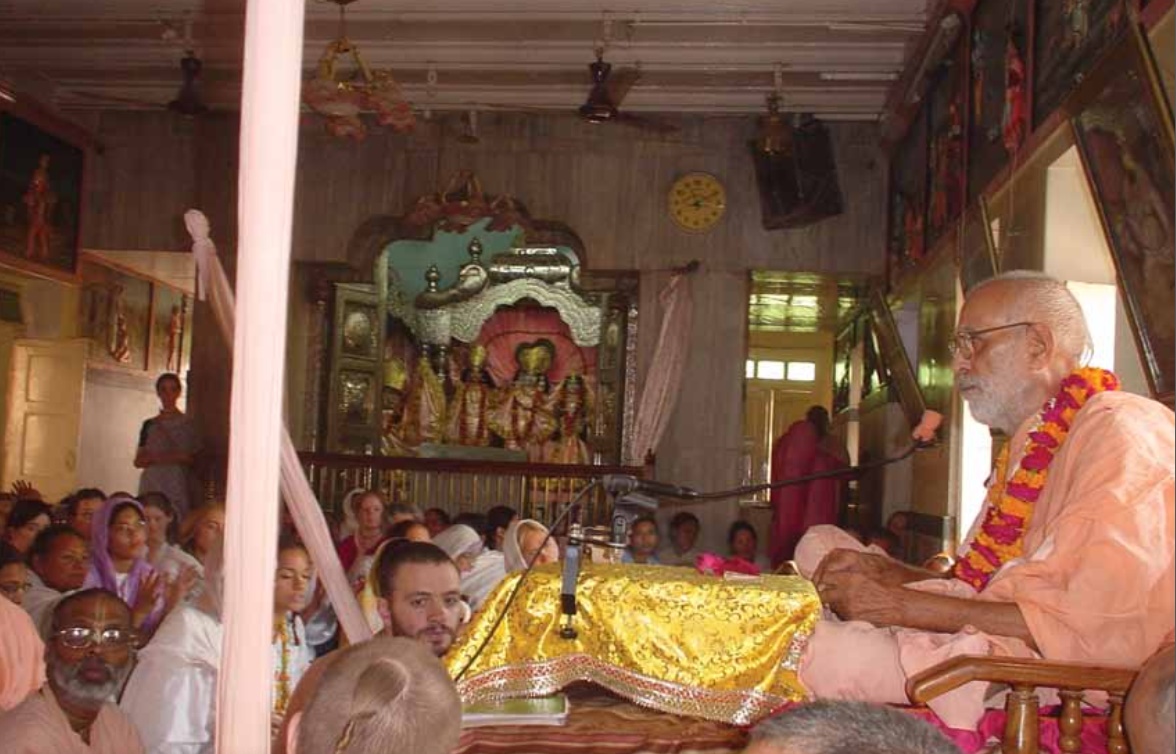
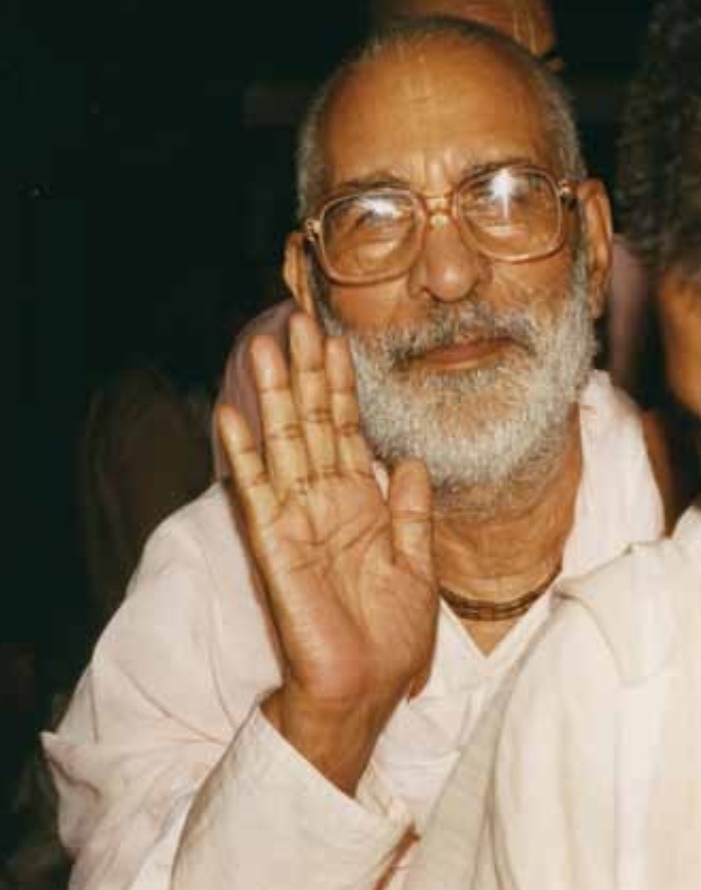
The Duty of an Ideal Disciple
What is the duty of an ideal disciple (śiṣya)? He should not merely always stay with gurudeva; he should try to give his energy to trying to serve him, according to gurudeva’s desires – by body, mind and words. He should not stay close to his guru physically, anticipating some excitement, all the while remaining unenthusiastic to serve. That is not a śiṣya but rather something quite opposite. A true disciple always desires, with all his heart and mind, to better serve gurudeva.
If a disciple is sacrificing as my gurudeva did, keeping all difficulties to himself, never complaining but continuing to serve his gurudeva, then gurudeva will be so pleased and the disciple will get his mercy. External blessings are no blessings. When blessings pour forth from the core of the guru’s heart, then they are real blessings.
Appearance day of Śrī Śrīmad Bhakti Prajñāna Keśava Gosvāmī Mahārāja
Mathurā, Kārtika 2000
